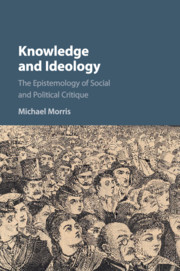Introduction
Published online by Cambridge University Press: 17 November 2016
Summary
The Tangled History of Ideology Critique
In the more than 160 years since Marx and Engels penned The German Ideology, the existing definitions and theories of ideology have proliferated beyond any readily manageable extent, forcing the more systematically minded authors, who address this topic, to preface their discussions with complex and often mutually conflicting systems of classification. What should we make of this diversity, this seemingly uncontrolled proliferation of meanings? In particular, what does it tell us about the proximate origins of the theory of ideology, that is, about the elaborations of this concept in Marx's work? Does it reveal the supreme fecundity of Marx's insights on this particular topic, or, rather, does it bespeak his confusion, his ambivalence, and his lack of conceptual rigor? More importantly, how should we now approach this unwieldy proliferation? Does the historical development and proliferation of ideology display any evident logic, any marked points of rupture or decision, any particularly decisive branches in the conceptual tree that maps the range of possibilities? In other words, can we, amidst the vast array presented by the currently extant theories of ideology, identify the conceptually significant fault lines that divide them, the central divisions that raise the most salient philosophical issues?
In his helpful study, Ideology: An Introduction, Terry Eagleton provides a basic framework for addressing these questions, roughly dividing the myriad conceptions of ideology into two dominant but divergent intellectual strands. He begins the first chapter, appropriately entitled, “What Is Ideology,” with an introductory catalogue of sixteen existing definitions, a catalogue that ranges from the predictable to the exotic, from “a body of ideas characteristic of a particular social group or class” to “semiotic closure,” from “ideas which help to legitimate a dominant political power” to “that which offers a position for a subject.” After documenting this wide range of definitions, Eagleton then offers the following observation:
We can note that some of these formulations involve epistemological questions – questions concerned with our knowledge of the world – while others are silent on this score … This distinction, as we shall see, is an important bone of contention in the theory of ideology, and reflects a dissonance between two of the mainstream traditions we find inscribed within the term.
- Type
- Chapter
- Information
- Knowledge and IdeologyThe Epistemology of Social and Political Critique, pp. 1 - 32Publisher: Cambridge University PressPrint publication year: 2016

